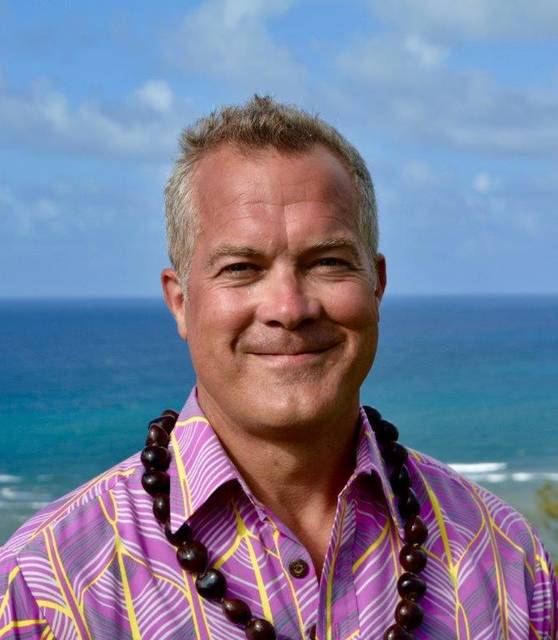w Editor’s note: This is the seventh of profiles on those running for Kauai County Council. Fourteen candidates are running for seven two-year seats.
County Council candidate Adam Roversi is a man of the law. With a dual degree from Reed College and a J.D. from University of Hawaii’s Richardson Law School, it’s no wonder Kauai’s deputy county attorney demonstrates his passion for legal acumen while on the campaign trail.
“One thing that sets me apart from the other candidates is my training and experience working as an attorney for the county, as well as state and federal government,” he said. “I have a particularly appropriate skillset to interpret and make useful, comprehensive and forward-looking laws.”
A resident of Kilauea since 1987, the 49-year-old explains that as a building contractor he was involved in fighting for the water rights of a friend that set him on the path he is on today. He obtained specialty degrees in environmental and Hawaiian law while in law school, and expresses deep appreciation for the cultural legacy ingrained into the island’s laws.
“A lot of the progressive things that exist in Hawaiian law are because our state law incorporated many Hawaiian concepts and traditions,” he said. “Even though ‘public trust’ is a term that exists in mainland law, it exists here because it is a Native Hawaiian concept.”
As the men’s coach and board member at Hanalei Canoe Club, Roversi has an acute appreciation for open access to beaches and mountains, attributed to time-honored values within the community.
When he came back to Kauai to take the post as deputy county
attorney, he did so with the intention of helping the island. Now, he’d like capitalize on his study of the county’s “levers of power” and move into shaping the laws as well.
First on his agenda if voted onto the council is addressing the high cost of housing, which is intimately intertwined with the high cost of living and economic opportunity.
“That’s what I envision being most focused on if elected, revamping our land use, zoning and sub-division laws to promote affordable housing, and at the same time boost economic development in some of the outer-lying communities by reorganizing the way we use our land by promoting mixed-use development,” Roversi said.
He acknowledges that amendments like updating Kauai’s land use policies will be a lengthy process, but by first changing the public mindset to prioritize improvements for residents, the county can ensure positive movement that will benefit everybody: locals and tourists.
“Far too often our county government simply reacts to problems after they’ve festered for a long time, and amends or enacts laws that are temporary patches to solve what’s directly in front of them at the moment,” he said.
Roversi cites the example of overabundant transient vacation rentals, now contributing to an islandwide housing crisis.
“What I would like to see and do is take a much more proactive, forward-looking approach to designing how we want our island to be in the future, predicting problems, and solving them before they become intractable and a mess,” he said.
If not elected, Roversi would like to create a Kauai community land trust, similar to Na Hale O Maui, to help residents find affordable housing and build equity. But he hopes to join the County Council’s ranks and leverage his training and practical experience.
With a clear understanding of the county’s scope of legal authority to solve problems, Roversi strives to provide practical realities and solutions instead of avoidance of issues.
As an example, when residents suggested closing the road to Wainiha for visitors during a recent forum, Roversi made it clear that such a solution was out of the county’s control, but suggested resolutions like improving public transit instead.
“Let’s recognize what we can do,” he said.


